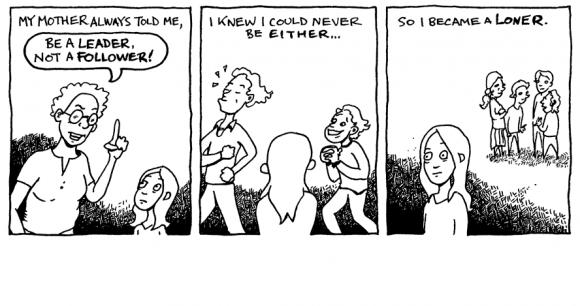Authenticity is hard to come by these days. It seems as though more and more of what we see are imitations, remakes, or knock-offs. With this transition, we have begun to learn how to recognize these fakes, and the same goes for people in society. Not a day goes by where we don’t encounter someone who comes across as less than genuine, through this we have been able to distinguish those who are true to themselves, and those who are not. Genuine people often make excellent leaders, and thus are classified as “authentic” leaders (Northouse, 2013).
While transformational leadership does focus on the betterment of followers through strong relationships and charisma, the chart above displays authentic leadership, and we can see how it compares to transformational leadership. However, it has since grown into its own being, one which will be developed over time as new research is conducted (Northouse, 2013). Given the newness of authentic leadership, the concept has a complex and somewhat disorganized design. Northouse breaks this design into three main functions: intrapersonal, interpersonal, and developmental (2013). Each of these styles has a very different perspective, with intrapersonal focusing on the leader themselves, interpersonal focusing on the relationship between leader and follower, and developmental focusing on the onset of authenticity in any leader, regardless of their “given” traits (Northouse, 2013; PSU, 2014).
The developmental perspective of authentic leadership is by far the most intriguing to me due to my personal history. When I was younger I was definitely not the most outgoing person, by switching schools in 4th grade I missed the boat in terms of lifelong friendships in my new school. Needless to say, I was not a leader. As I grew older I started to make friends outside of school ultimately leading to me becoming more confident. Regardless of this confidence, I still did not identify as a leader. Even in my early years of high school I didn’t consider myself a leader whatsoever and I doubt anyone else did either.
However, as time passed and I got older and wiser, I became more popular and confident. Today, I would consider myself to be an excellent leader, and most importantly, an authentic one. Through my life experiences I gained the insights necessary in recognizing the needs of people, I became empathetic and keen to their perspectives. According to the developmental perspective of an authentic leader as defined by Northouse, this leadership ability can be obtained at any time, through major life events or a series of events (2013). I am a true believer in the ideology that people can change and grow, whether it be a loner in high school, or an introvert in a large corporation, anything is possible and anyone can be a leader.
It’s evident that my new sense of leadership came from a development over time. Northouse suggests that this development is derived from self-awareness, internalized moral-perspective, balanced processing, and relational transparency (2013). I believe that these four components are ever-changing in all of us, allowing us to become leaders when the opportunity arises. With my gradual boost in confidence throughout my adolescence, I became more self-aware, distinguishing my wants and needs and career goals. I also recall becoming more responsible overall, although I was always an empathetic person, I started to recognize my ability to understand multiple perspectives of the same issue and make smarter decisions. With all of this I became a better person overall, which allowed me to be honest with myself and others without bias.
As previously mentioned, I believe we all undergo transformations throughout our lives, sometimes for the worse and other times for the better. It would be foolish to proclaim that we cannot learn what we choose. We are not born mathematicians, engineers, actors, or dancers, these are things we can learn and develop throughout our lives if we choose to. With that being said, why wouldn’t we be able to become better leaders? It simply wouldn’t make sense.
References:
Northouse, P.G. (2013). Leadership: Theory and Practice. Los Angeles, CA: Sage Publications, Inc.
Pennsylvania State University World Campus (2014). Lesson 12: Authentic Leadership . PSYCH 485: Leadership in Work Settings. Retrieved from:https://courses.worldcampus.psu.edu/su14/psych485/001/content/12_lesson/01_page.html





Great post! I can definitely relate to your post as I truly believe that being a loner enables you to create self-awareness, truly getting to know yourself. It is often said after bad breakups that the individual needs to take some time to themselves so that they can truly get to know themselves, become confident in themselves, and enable them to truly be ready to give themselves to another individual. Although your situation deals with friendships, it is definitely worthy of comparison. According to Northouse (2013) the authentic leadership perspective emphasizes the leader’s life experiences and the meaning that individuals attach to those experiences which are critical development of the authentic leader (p. 254). In order to be a genuine leader to others, or genuine participant in any relationship, you often have to go through some type of struggle or have gotten over a hurdle. Those who have been through the most are able to inspire and motivate others the most.